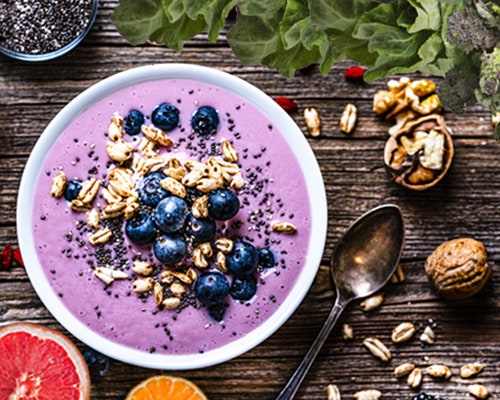Energize with B-Complex
- 1/4/17

by Dawn Thorpe Jarvis, M.S., R.D., L.D.N., Garden of Life Sr. Director of Nutrition Science and Educational Content.
Referred to as vitamin B-complex, these eight water-soluble B vitamins are essential to the body: B1 (thiamine), B2 (riboflavin), B3 (niacin), B5 (pantothenic acid), B6 (pyridoxine), B7 (biotin), B9 (folate) and B12 (cyanocobalamin). They have inter-related functions, but together they play an important role in keeping our bodies running smoothly. These important co-nutrients help to convert fat, proteins and carbohydrates in our food into fuel, allowing us to stay energized throughout the day. They work together and are often described as the spark plugs of our body, providing both mental and physical energy.
Generally B vitamins are found in unprocessed whole grains, but when foods such as rice or other cereals are processed, most of the B vitamins are lost. Hence, it is required by law in many countries (including the U.S.) to add back B vitamins after processing. Good sources of natural B vitamins include meats, poultry, legumes (beans and pulses), seafood, potatoes, eggs, leafy greens, dairy, bananas, chili peppers and nutritional yeast. B vitamins are water soluble, are not stored in the body and are constantly excreted. Therefore, they need to be consumed regularly. They are also easily destroyed by heat during cooking, especially when boiled, due to leaching into the cooking water.
Deficiency in one or more vitamins in this group can occur easily, and individuals who may benefit from B-complex include strict vegetarians; those dealing with stress (emotional and physical); people losing weight or fasting; athletes; those on restricted diets or diets high in processed foods or mostly cooked foods; people exposed to environmental toxins; and anyone with poor appetite or low energy.
Vitamin B12, found only in animal foods, is often referred to as the “energy” vitamin and plays a critical role in the production of cellular energy. It is also needed for DNA synthesis and for healthy nervous system function. Along with vitamin B6, it is needed for healthy red blood cell production. Individually, B vitamins have many other important benefits. For example, biotin is often recommended for healthy hair and nails. Folate is used by the body to break down and synthesize amino and nucleic acids, which are needed to build new cells, particularly red blood cells.† Folate is important during pregnancy to prevent neural tube defects in the developing baby. Folate is also known to support a healthy heart when taken in conjunction with vitamins B6 and B12.†
According to Dr. Perlmutter, board-certified neurologist, B vitamins are your best protection against elevated levels of homocysteine, an amino acid produced in the body that, in excess, can increase your risk of mood disorders, poor mental performance and Alzheimer’s disease.
So, be sure to energize with B-complex!
Referred to as vitamin B-complex, these eight water-soluble B vitamins are essential to the body: B1 (thiamine), B2 (riboflavin), B3 (niacin), B5 (pantothenic acid), B6 (pyridoxine), B7 (biotin), B9 (folate) and B12 (cyanocobalamin). They have inter-related functions, but together they play an important role in keeping our bodies running smoothly. These important co-nutrients help to convert fat, proteins and carbohydrates in our food into fuel, allowing us to stay energized throughout the day. They work together and are often described as the spark plugs of our body, providing both mental and physical energy.
Generally B vitamins are found in unprocessed whole grains, but when foods such as rice or other cereals are processed, most of the B vitamins are lost. Hence, it is required by law in many countries (including the U.S.) to add back B vitamins after processing. Good sources of natural B vitamins include meats, poultry, legumes (beans and pulses), seafood, potatoes, eggs, leafy greens, dairy, bananas, chili peppers and nutritional yeast. B vitamins are water soluble, are not stored in the body and are constantly excreted. Therefore, they need to be consumed regularly. They are also easily destroyed by heat during cooking, especially when boiled, due to leaching into the cooking water.
Deficiency in one or more vitamins in this group can occur easily, and individuals who may benefit from B-complex include strict vegetarians; those dealing with stress (emotional and physical); people losing weight or fasting; athletes; those on restricted diets or diets high in processed foods or mostly cooked foods; people exposed to environmental toxins; and anyone with poor appetite or low energy.
Vitamin B12, found only in animal foods, is often referred to as the “energy” vitamin and plays a critical role in the production of cellular energy. It is also needed for DNA synthesis and for healthy nervous system function. Along with vitamin B6, it is needed for healthy red blood cell production. Individually, B vitamins have many other important benefits. For example, biotin is often recommended for healthy hair and nails. Folate is used by the body to break down and synthesize amino and nucleic acids, which are needed to build new cells, particularly red blood cells.† Folate is important during pregnancy to prevent neural tube defects in the developing baby. Folate is also known to support a healthy heart when taken in conjunction with vitamins B6 and B12.†
According to Dr. Perlmutter, board-certified neurologist, B vitamins are your best protection against elevated levels of homocysteine, an amino acid produced in the body that, in excess, can increase your risk of mood disorders, poor mental performance and Alzheimer’s disease.
So, be sure to energize with B-complex!





